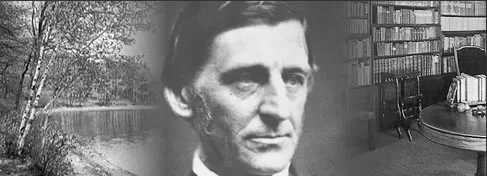This essay originally appeared in The Ideal in the West, by David A. Beardsley (idealinthewest.com)
I think it’s safe to say that when most people consider Ralph Waldo Emerson, they think

of a rather avuncular producer of pithy quotes in an archaic style of writing. Although his words still pop up with fair frequency, especially now given the presence of online quotation catalogs, I also think it’s safe to say that most people know little of Emerson’s life, or his deep connection with and expression of the Ideal.¹ He is usually labelled a Transcendentalist², along with Thoreau and others of his circle, but he never warmed to that slightly condescending term. As he said in his lecture entitled The Transcendentalist, “The first thing we have to say respecting what are called ‘new views’ here in New England, at the present time, is, that they are not new, but the very oldest of thoughts cast into the mould of these new times…. What is popularly called Transcendentalism among us, is Idealism; Idealism as it appears in 1842.”³ He was very aware of the tradition we have been considering, and considered himself a humble bearer of it.
Emerson was born in Boston in 1803, to a respectable Congregationalist minister, William Emerson and his wife Ruth Haskins Emerson. He was the third of what would be six sons, and expectations for him were never very high. His father died when he was eight, and the genteelness of their poverty was thus taken away; the family was now just poor. But education and the life of the mind were still valued highly, and Waldo and his brothers would take turns attending the Boston Latin School, and being tutored by a remarkable collection of mostly women–family friends and relatives. The chief among these influences was his father’s sister, Mary Moody Emerson, who Robert Richardson says “was an American Jakob Boehme. Her everyday life was spent wrestling with angels.”4 She would write, visit, and be a presence in Waldo’s life until her death in 1863.
Waldo was accepted into Harvard at the age of fourteen and was able to attend by dint of a scholarship, working, and the support of his brother William. In his junior year he began to keep a journal, which he would continue to do almost to the end of his life. It soon became a repository for his deepest thoughts and his growing sense of the presence in his life of what he would later call “The Over-Soul.” In it he is writing to himself for himself about himself. On December 21 1823 he writes, “I say to the Universe, Mighty one! thou art not my mother; return to chaos if thou wilt, I shall still exist. I live. If I owe my being, it is to a destiny greater than thine. Star by star, world by world, system by system shall be crushed–but I shall live.”5
Waldo graduated in the middle of his class, still unsure of his vocation. His two older brothers had become teachers; he followed suit, and their pooled resources greatly helped the family’s financial outlook. But he was still not satisfied. Just before turning twenty-one, he notes in his journal “I burn after the ‘aliquid imensum infinitumque’ (“something great and immeasurable”) which Cicero desired.” (April 18, 1824) While continuing to teach, Waldo returned to Harvard Divinity School and emerged “approbated to preach,” in 1826. He had already established a reputation as a speaker by filling in various pulpits in New England, but he still suffered from what might be called an existential crisis: “My years are passing away. Infirmities are already stealing on me that may be the deadly enemies that are to dissolve me to dirt and little is yet done to establish my consideration among my contemporaries & less to get a memory when I am gone.” (March 27, 1826)
He was also suffering from physical ill health, and the following winter he made a trip to Florida to help recover. There he reconnected with the unnameable: “There is a pleasure in the thought that the particular tone of my mind at this moment may be new in the Universe; that the emotions of this hour may be peculiar & unexampled in the whole eternity of moral being. I lead a new life. I occupy new ground in the world of spirits, untenanted before. I commence a career of thought & action which is expanding before me into a distant & dazzling infinity. Strange thoughts start up like angels in my way & beckon me onward. I doubt not I tread on the highway that leads to the divinity.” (April 17, 1827)
Returning to New England he continued preaching and drawing admirers–including, while in Concord New Hampshire, the beautiful young Ellen Louisa Tucker. In December of 1828 they became engaged, and the following January Waldo was called to be minister of the Second Church of Boston. He became the family’s main breadwinner, then chaplain of the Massachusetts legislature, then member of the Boston school committee. As Richardson says, “Emerson the private person became more or less overnight a complete institutional person.”6
But it wasn’t to last. In February 1831, Ellen, always frail, then tubercular, died after a long illness. Her last words were, “I have not forgot the peace and joy.” Emerson came undone. By the end of the year he resigned his ministry, sold his belongings, packed up his grief and boarded a ship bound for Europe.

His journeys started in the island of Malta, through Italy to France and then to England. While he was escaping from the pain of Boston, he was also entering into a new world of art and religious expression. He saw everything, he wrote in his journal, he met other writers. In Paris, while decrying it as “a loud modern New York of a place,” he discovered at an exhibition at the Jardin des Plantes a fascination with the huge variety of the plant and animals worlds, and his relation to it. “I feel the centipede in me–cayman, carp, eagle, & fox. I am moved by strange sympathies, I say continually, ‘I will be a naturalist.'” (July 13, 1833)  He moved on to England, home of his own ancestors, met Wordsworth, Coleridge, and Thomas Carlyle, but oddly, as mentioned before, not Thomas Taylor.  It is safe to say that at the end of his journey, he was renewed in body, mind and spirit.  He returned to Boston in October of 1833, full of ideas for a new life.
He began writing furiously, but also returned to supply preaching. Â It was at one of these

engagements that he met Lydia Jackson of Plymouth, whom he married in 1835, and they moved into the famous boxy white house on the Cambridge Turnpike in Concord. Â In 1836 he published his first book, Nature, 7 his ambitious attempt, it might be said, at a Grand Unified Theory.
Undoubtedly we have no questions to ask which are unanswerable. We must trust the perfection of the creation so far, as to believe that whatever curiosity the order of things has awakened in our minds, the order of things can satisfy. Every man’s condition is a solution in hieroglyphic to those inquiries he would put. He acts it as life, before he apprehends it as truth. In like manner, nature is already, in its forms and tendencies, describing its own design. Let us interrogate the great apparition, that shines so peacefully around us. Let us inquire, to what end is nature?
Although “Nature” did not sell well initially, it was very influential among the cogniscenti of Boston, and soon Emerson found himself to be a favorite on the growing Lyceum lecture circuit. For about the next forty years he would spend a large part of his time on the road, lecturing, the other part writing and being with friends. He started a magazine, The Dial, with his friend Margaret Fuller, and became father to two daughters, Ellen and Edith. In 1841, his first book of Essays was published, which included some of his most famous works, Self Reliance and The Over-Soul, and his fame increased even more. It was a heady time, even more than his days at the Second Church, since now his life was on his own terms.
But now, as then, a death intervened. On January 27, 1842, his son Waldo died. Three days later he wrote in his journal, “Sorrow makes us all children again, destroys all differences of intellect. The wisest know nothing.” But while it would be wrong to minimize his grief–or, like some, to say that he lost his optimism–I believe he did retain his knowledge of the Good; the Good as that which endures, which is eternal, of which the body is a relic. In his poem Threnody he asks himself in the voice of “the deep heart:”
Wilt thou not ope thy heart to know
What rainbows teach, and sunsets show?
Verdict which accumulates
From lengthening scroll of human fates,
Voice of earth to earth returned,
Prayers of saints that inly burned,–
Saying, What is excellent,
As God lives, is permanent;
Hearts are dust, hearts’ loves remain;
Heart’s love will meet thee again.

Of all the philosophers we have considered, Emerson was the most “in the world.” We have not had time to look at many large aspects of his life–his abolitionist activities, his own Idealist circle, his poetry and friendships–but they can serve to instruct us that it is not necessary to withdraw from the world in order to know the Ideal. It was the foundation of his life, the medium through which he moved and in which he rested. And while he offers many profound descriptions of the Ideal–indeed he is often working at the edge of what is expressible–perhaps his most profound evidence is in his gift for the simple, unadorned, but penetrating Observation. In his journal, March 29 1869, he records a meeting with his dear friend Bronson Alcott.
Alcott came & talked Plato & Socrates, extolling them with gravity. I bore it long, & then said, that was a song for others, not for him. He should find what was the equivalent for these masters in our times: for surely the world was always equal to itself, & it was for him to detect what was the counter-weight & compensation to us. Was it natural science? Was it the immense dilution of the same amount of thought into nations?
I told him to shut his eyes, & let his thoughts run into reverie or whithersoever–& then take an observation. He would find that the current went outward from man, not to man. Consciousness was up stream.8

This work is licensed under a Creative Commons Attribution-NonCommercial-NoDerivs 3.0 Unported License Graphics are not copyrighted, and are believed to be in the public domain.
¹While I believe Emerson was a universal man, and that his revelations would have been the same wherever and whenever he appeared, there are key events in his life that I will be discussing. For more on this, there are biographies of course (see sidebar), and my own video documentary, Emerson: The Ideal in America. (I will also just mention that I receive no income from the sale of these DVDs; all proceeds go to the RWE Institute.)
²The term Transcendentalist was originally applied to the group of German philosophers that included Kant, Hegel, Schelling and others, and this is as good a time as any to discuss why they are not included in this history. To be honest, I have not read them extensively, but I believe that their approach to the Ideal is that of the Sophists whom Socrates ridiculed; that is to say they make it a mental concept that can be described and debated, and their writing tends to obscure it. It becomes a subject for examination by the mind rather than the transcendent reality that produces the mind. I believe that reading any random paragraph of one of the Germans and one by any other the writers discussed here will reveal the difference in tone and understanding.
³I promise not to let the footnotes continue to be longer than the text, but I did just want to point out the missing sentence indicated by the ellipsis above as an example of Emerson’s diving right into the subject. In one of the best summations I know of the Ideal he says, “The light is always identical in its composition, but it falls on a great variety of objects, and by so falling is first revealed to us, not in its own form, for it is formless, but in theirs; in like manner, thought only appears in the objects it classifies.”
4Robert D. Richardson Jr., Emerson: The Mind on Fire, University of California Press, 1995Â For more on MME, see Phyllis Cole, Mary Moody Emerson and the Origins of Transcendentalism, Oxford University Press, 1998
5Joel Porte, ed., Emerson in His Journals, Harvard University Press, 1982
6Richardson, op. cit.
7In his journal on Aug. 27, 1836, Emerson says, “Today came to me the first proof-sheet of ‘Nature’ to be corrected, like a new coat, full of vexations; with the first sentences of the chapters perched like mottoes aloft in small type! The peace of the author cannot be wounded by such trifles, if he sees that the sentences are still good. A good sentence can never be put out of countenance by any blunder of compositors. It is good in text or note, in poetry or prose, as title or corollary. But a bad sentence shows all his flaws instantly by such dislocation.” Joel Porte, ed., op. cit.
8Joel Porte, ed., op. cit.
